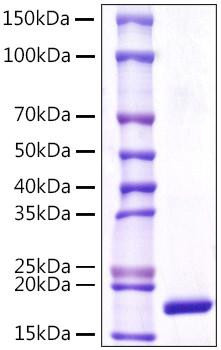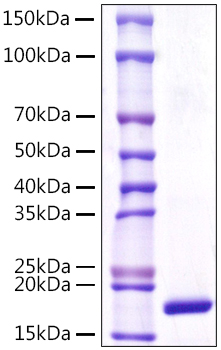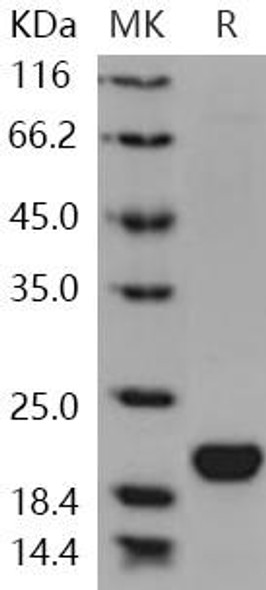Description
Recombinant Human Lipocalin-1/LCN1 Protein
The Recombinant Human Lipocalin-1/LCN1 Protein is a biologically active recombinant protein that plays a significant role in various cellular processes and signaling pathways in human biology. This protein is widely employed in immunological research, cell biology studies, protein-protein interaction analyses, and therapeutic development, providing researchers with a reliable tool for investigating Lipocalin-1/LCN1 function and its implications in health and disease.
This product (SKU: RPCB1062) is produced using HEK293 cells and features a C-His tag for convenient detection and purification. The protein exhibits a calculated molecular weight of 18.28 kDa with an observed molecular weight of 18-20 kDa under denaturing conditions, achieving ≥ 95 % as determined by SDS-PAGE.. Functional bioactivity has been validated through rigorous quality control assays, confirming its suitability for demanding research applications.
Key Features
| High Purity by Affinity Chromatography | |
| Mammalian & Bacterial Expression Systems | |
| High lot-to-lot consistency via strict QC |
| Product Name: | Recombinant Human Lipocalin-1/LCN1 Protein |
| SKU: | RPCB1062 |
| Size: | 10 μg , 20 μg , 50 μg , 100 μg |
| Reactivity: | Human |
| Synonyms: | LCN1, PMFA, TLC, TP, VEGP |
| Tag: | C-His |
| Expression Host: | HEK293 cells |
| Calculated MW: | 18.28 kDa |
| Observed MW: | 18-20 kDa |
| Gene ID: | 3933 |
| Protein Description: | High quality, high purity and low endotoxin recombinant Recombinant Human Lipocalin-1/LCN1 Protein (RPCB1062), tested reactivity in HEK293 cells and has been validated in SDS-PAGE.100% guaranteed. |
| Endotoxin: | < 0.1 EU/μg of the protein by LAL method. |
| Purity: | ≥ 95 % as determined by SDS-PAGE. |
| Formulation: | Lyophilized from a 0.22 μm filtered solution of PBS, pH 7.4. |
| Bio-Activity: | Measured by its ability to inhibit active Cathepsin V cleavage of a fluorogenic peptide substrate Z-LR-AMC. The IC50 value is <2.94 nM. |
| Reconstitution: | Centrifuge the vial before opening. Reconstitute to a concentration of 0.1-0.5 mg/mL in sterile distilled water. Avoid vortex or vigorously pipetting the protein. For long term storage, it is recommended to add a carrier protein or stablizer (e.g. 0.1% BSA, 5% HSA, 10% FBS or 5% Trehalose), and aliquot the reconstituted protein solution to minimize free-thaw cycles. |
| Storage: | Store at -20℃.Store the lyophilized protein at -20℃ to -80 ℃ up to 1 year from the date of receipt. After reconstitution, the protein solution is stable at -20℃ for 3 months, at 2-8℃ for up to 1 week. |
Lipocalin-1, also known as Von Ebner gland protein, VEG protein, Tear Prealbumin, VEGP, Tear lipocalin, and LCN1 is a secreted protein that belongs to the calycin superfamily and Lipocalin family. Human Lipocalin-1 / VEGP was originally described as a major protein of human tear fluid, which was thought to be tear specific. Lipocalin-1 / VEGP is identical to lingual von Ebner's gland protein and is also produced in the prostate, nasal mucosa, and tracheal mucosa. Homologous proteins have been found in the rat, pig, and probably dog and horse. Lipocalin-1 / VEGP is an unusual lipocalin member, because of its high promiscuity for relative insoluble lipids and binding characteristics that differ from other members. Lipocalin-1 / VEGP acts as the principal lipid-binding protein in tear fluid, a more general physiological function has to be proposed due to its wide distribution and properties. Lipocalin-1 / VEGP would be ideally suited for scavenging of lipophilic, potentially harmful substances and thus might act as a general protection factor of epithelia. Lipocalin-1 / LCN1 could play a role in taste reception. It could be necessary for the concentration and delivery of sapid molecules in the gustatory system. Lipocalin-1 / LCN1 can bind various ligands, with chemical structures ranging from lipids and retinoids to the macrocyclic antibiotic rifampicin and even to microbial siderophores. It exhibits an extremely wide ligand pocket.







